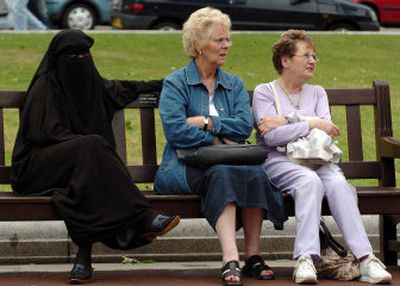British Sunnis condemn deadly London blasts

BIRMINGHAM, England – Ten days after Islamic radicals carried out deadly attacks on the London transportation system, Britain’s largest Sunni Muslim group issued on Sunday a binding religious edict, a “fatwa,” condemning the July 7 suicide bombings as the work of a “perverted ideology.”
The Sunni Council denounced the bombings as anti-Islamic and said the Quran, the Muslim holy book, forbids suicide attacks.
“Who has given anyone the right to kill others? It is a sin. Anyone who commits suicide will be sent to hell,” said Mufti Muhammad Gul Rehman Qadri, the council chairman. “What happened in London can be seen as a sacrilege. It is a sin to take your life or the life of others.”
The council said Muslims should not use “atrocities being committed in Palestine and Iraq” to justify attacks such as those in London that killed 55 when suicide bombers struck three Underground trains and a double-decker bus, the Sunni edict declared.
“We equally condemn those who may have been behind the masterminding of these acts, those who incited these youths in order to further their own perverted ideology,” Qadri said.
More than 2,000 Sunni clerics, scholars and community leaders attended Sunday’s meeting, which had been scheduled before the bombings.
Also Sunday, British government officials dismissed claims that lax attitudes have allowed homegrown suicide bombers to develop.
The Sunday Times reported that one suspected bomber, 30-year-old Mohammad Sidique Khan, was investigated last year by MI5, Britain’s domestic intelligence service, but was not regarded as a threat to national security or put under surveillance.
MI5 began evaluating Khan, a Briton of Pakistani ancestry, during an inquiry that focused on an alleged plot to explode a large truck bomb outside a target in London thought to be a nightclub in Soho, the newspaper said. The private inquiry reportedly evaluated hundreds of potential suspects.
The Metropolitan Police and a spokesman for Prime Minister Tony Blair declined comment Sunday.
The bombings have prompted the British government to propose legislation outlawing “indirect incitement” of terrorism – including public praise for those who carry out attacks.
Nevertheless, Charles Falconer, the secretary for constitutional affairs and lord chancellor, denied that the government has not been diligent in screening political refugees from Muslim countries, making Britain a fertile recruiting ground for Islamic terrorism.
“In terms of asylum, our policy is: If you are in fear of persecution, you are entitled to come here,” the minister said on BBC television. “Obviously, if you then seek to attack the very state that you came to, that gives rise to different questions. But I don’t think we have been ultraliberal. … What we have got to do now is unify all the forces in our society, in particular in the Muslim community, against those people who are fundamentally at odds with our values.”
The Sunni edict was issued as investigators in the northern city of Leeds continued to focus on an Islamic bookshop and a house near the home of one of the four alleged bombers, 22-year-old Shahzad Tanweer.
Tanweer, born in Britain to Pakistani parents, is believed to be one of the Underground train bombers and reportedly visited two religious schools on a trip to Pakistan.
Pakistani intelligence agents have questioned students, teachers and administrators at the schools in central Lahore and at least two other al Qaeda-linked radical Islamic centers, showing pictures and a dossier on Tanweer.
In an interview on CNN’s “Late Edition,” British Defense Secretary John Reid expressed concern about Pakistan’s religious schools, saying they “are a major source of international instability and contribute largely toward the growth of terrorist activity.”
Police said Sunday night that six men were arrested in Leeds under Britain’s anti-terrorism act, but police later retracted the claim and said the men were arrested on immigration offenses.